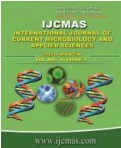


 National Academy of Agricultural Sciences (NAAS)
National Academy of Agricultural Sciences (NAAS)

|
PRINT ISSN : 2319-7692
Online ISSN : 2319-7706 Issues : 12 per year Publisher : Excellent Publishers Email : editorijcmas@gmail.com / submit@ijcmas.com Editor-in-chief: Dr.M.Prakash Index Copernicus ICV 2018: 95.39 NAAS RATING 2020: 5.38 |
Rice is sensitive to high temperature, especially at the reproductive stage, which causes spikelet sterility and yield losses. The increase in both frequency and intensity of high temperature, along with its large variability, is emerging as a potential threat to the sustainability of rice production. The predicted 2–4°C increment in temperature by the end of the 21st Century poses a threat to rice production. The impact of high temperatures at night is more devastating than day-time or mean daily temperatures. Booting and flowering are the stages most sensitive to high temperature, which may sometimes lead to complete sterility. Recent data reveal an abnormal increase in diurnal temperatures, with night temperature increasing at a much faster rate than day temperature. To identify heat-tolerant genetic resources for future genetic studies and breeding 29 rice genotypes were screened at Raipur in the summer season (2015).
 |
 |
 |
 |
 |